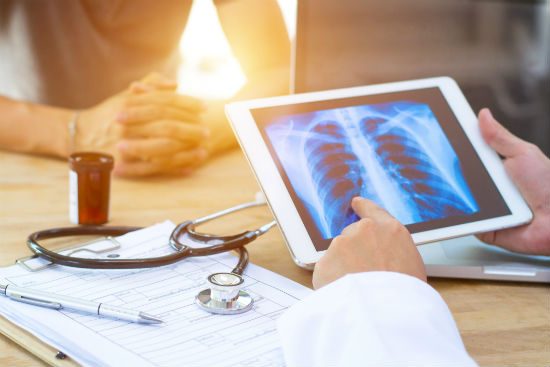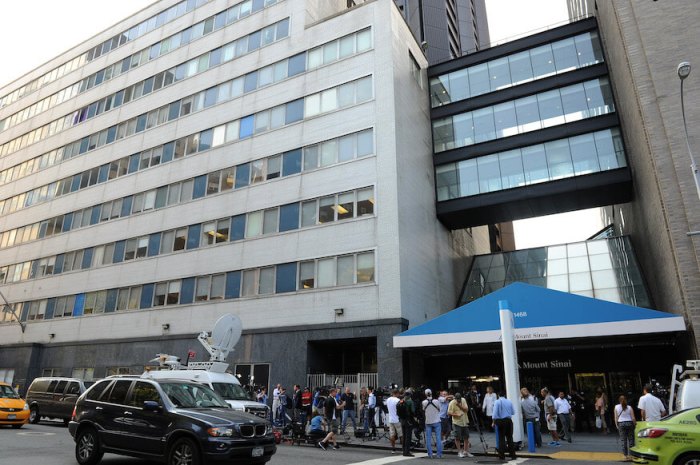According to the American Cancer Society, lung cancer is “the leading cause of cancer death among both men and women Each year, more people die of lung cancer than of colon, breast, and prostate cancers combined.” Lung Care Awareness Month is winding down, but the issue never stops being relevant. We talked to Dr. Nicholas Rohs, assistant professor of medicine, hematology and medical oncology at the Icahn School of Medicine at Mount Sinai, for more information.
Everything you need to know about lung cancer

Photo: iStock
How common is lung cancer in the U.S.?
Aside from skin cancer, lung cancer is the second most common cancer in both men and women with an average age at diagnosis of 70. Over 13% of all new cancers are lung cancer, but sadly it accounts for more than 25% of all cancer-related deaths. Fortunately, the number of new lung cancers has slowly been declining with decreasing rates of smoking.
Do you have to be a smoker to get it?
Smoking is certainly the main risk factors for developing lung cancer, but up to 20% of people diagnosed with lung cancer are never or very light smokers. However, even a small amount of smoking can increase your lung cancer risk. Interestingly, tripling the number of cigarettes you smoke per day can triple your risk for lung cancer while tripling the amount of time you have smoked can increase your risk up to 100 times!
How common is it among non-smokers?
The risk of getting lung cancer in non-smokers is significantly less than in smokers, but the only risk factor you need to develop lung cancer is lungs and non-smoking related lung cancers are on the rise. People with suppressed immune systems such as those with HIV/AIDS and patients who have undergone organ transplants are three times more likely to develop a lung cancer. Other risks factors include environmental exposures such as radon, arsenic, or asbestos. You are also more likely to get lung cancer if a closely related family member had lung cancer.
Can you get lung cancer from secondhand smoke?
Yes, unfortunately, second-hand smoke can increase your risk of lung cancer by as much as 20-30 percent. Your risk increases the closer and more regular your exposure to second-hand smoke is.
Besides not smoking, what are other preventive steps you can take?
The best way to prevents most cancers is by maintaining a healthy lifestyle with a well-balanced diet, regular exercise, and good control of any other medical conditions you may have. For patients who are already at increased risk of lung cancer, I strongly recommend lung cancer screening with a low-dose CT scan. This includes people between the ages of 55 and 80 who have smoked within the past 15 years and averaged at least 30 “pack-years” of smoking. To calculate your “pack years” simply multiply your average packs of cigarettes smoked per day times the number of years you have smoked. Low-dose CT screening is a safe and effective way to diagnose lung cancer early and has shown in a recent study to decrease death from lung cancer by up to 26% in men and between 39-61% in women! I encourage everyone at risk to learn more by asking their doctor.
If lung cancer is caught early, how is it treated? What is the prognosis?
Most early lung cancer is treated with surgery. If a tumor is large enough or has spread locally than chemotherapy is often added either before or after surgery to increase cure rates. If a patient is too frail or has other reasons not to have surgery then radiation therapy is another good option for treating early-stage lung cancer. It is also sometimes combined with chemotherapy to increase cure rates. Prognosis depends on exactly what stage and sub-type of lung cancer you have as well as your other medical issues, but while we continued to make improvements in cure rates for lung cancer it continues to be a dangerous disease.
Are you ever “cured” of lung cancer? Is there such a thing as remission?
Absolutely, we are able to cure some lung cancers and we are working hard to increase the number we are able to cure. The earlier the stage of your disease the more likely we are able to cure it. However, even the earliest stage of disease has a risk of returning and we follow patients for at least five years after treatment to monitor for any recurrence. We certainly see patients with long-term control of advanced disease that could be considered a remission and many of these patients continue to enjoy a great quality of life. With newer treatments such as targeted therapies and immunotherapies, we are increasing the chance of keeping the disease under control for longer.
Is it ever too late to quit smoking?
Never! Not only will quitting smoking decrease your risk of lung cancer, but will also decrease your risk of cardiovascular diseases such as heart attack and stroke as well as saving you a lot of money! There are many different resources available to help people quit smoking. Ask your doctor for ways they can help support you.


















